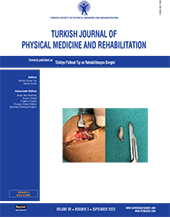The effect of high-frequency repetitive transcranial magnetic stimulation on motor recovery and gait parameters in chronic incomplete spinal cord injury: A randomized-controlled study
2 Department of Physical Medicine and Rehabilitation, University of Health Sciences, Gaziler Physical Therapy and Rehabilitation Training and Research Hospital, Ankara, Türkiye DOI : 10.5606/tftrd.2023.11585 Objectives: This study aims to examine the effect of high-frequency repetitive transcranial magnetic stimulation (rTMS) on gait parameters and lower extremity motor recovery in a more specific sample of individuals with chronic and traumatic incomplete spinal cord injury (iSCI).
Patients and methods: This double-blind, sham-controlled, randomized study included a total of 28 individuals (20 males, 8 females; mean age: 35.7±12.1 years; range, 18 to 45 years) with chronic (>1 year) traumatic iSCI. The participants were randomly allocated to either sham rTMS group (n=14) or real rTMS group (n=14). We compared the groups based on the lower extremity motor scores (LEMS), the temporal-spatial gait measurements using three-dimensional gait analysis, the Walking Index for SCI–II (WISCI-II), and 10-m walking test at baseline, three weeks (post-treatment) and five weeks (follow-up) after the treatment.
Results: The real rTMS group revealed a significant improvement in walking speed, LEMS score, and 10-m walking test after the treatment compared to baseline (p=0.001, p=0.002, and p=0.023, respectively). Changes in the LEMS score were significantly increased in the real rTMS group compared to the sham group at both three and five weeks (p=0.001 and p=0.001, respectively). No significant difference was observed in the other variables between the groups (p>0.05).
Conclusion: Our study findings support the therapeutic effectiveness of rTMS on motor recovery in chronic iSCI. The rTMS can be used as an adjuvant therapy to conventional physiotherapy in the rehabilitation of patients with iSCI.
Keywords : Gait, motor recovery, repetitive transcranial magnetic stimulation, spinal cord injury
















